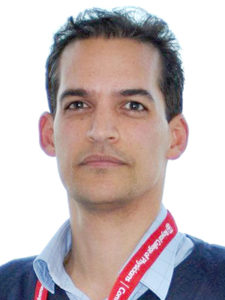
The transformative nature of mobile tech continues to accelerate, with benefits for clinical care settings, research, and rehabilitation specific to rheumatology. An ACR/ARHP session,Get Smart: Mobile and Wearable Technology in Rheumatology, will update attendees on the latest in wearable technology and other digital health advances. The session takes place from 9:00 – 10:00 am Monday in Room W476.
William G. Dixon, MRCP, PhD, will discuss the benefits of using mobile and wearable technology in clinical practice, as well as the challenges of integrating patient data into clinical settings.
Dr. Dixon is Professor of Digital Epidemiology and Director of the Arthritis Research UK Centre for Epidemiology at the University of Manchester, England, and was the chief investigator of the Remote Monitoring of Rheumatoid Arthritis Study, which involved the development, testing, and evaluation of a smartphone app to remotely monitor symptoms in patients.
“Currently, patients with rheumatoid arthritis are asked about changes in their condition at clinic appointments that can be up to several months apart, which means patients may struggle to accurately remember the details of these changes,” Dr. Dixon said. “The app allowed patients to record symptoms on a daily basis and log the impact of their RA between clinic appointments.”
The data were sent directly to and integrated with the patients’ electronic health records, he said, while anonymized data was also sent to a research database. Patients and their clinicians were able to use the app data to discuss how their RA had changed since the previous appointment.
“Both patients and clinicians found the app usable and thought that it collected the right data and provided insight into changes in RA symptoms through time,” Dr. Dixon said. “New ways of gathering passive and self-reported data regularly from the patient, and integrating this with their rheumatology EHR, has the potential to transform management, leading to improved health, well-being, and satisfaction by patients.”

The use of wearable technology in rehabilitation will be the topic of a presentation by Daniel White, PT, ScD, MSc, Assistant Professor in the Department of Physical Therapy at the University of Delaware, Newark, DE. White is currently involved in a study evaluating the use of the Fitbit physical activity tracker to increase physical activity in patients after total knee replacement.
“Harnessing the ability to use wearable technologies to record and help promote physical activity in rheumatology and rehabilitation is important for clinicians because so many patients are sedentary and subsequently at risk of poor health outcomes due to inactivity,” Dr. White said. “Understanding methods to increase activity that utilize the growing market of wearable sensors is a logical and important step to take. This technology can help the everyday clinician recommend, prescribe, and track physical activity in their patients’ daily lives.”


